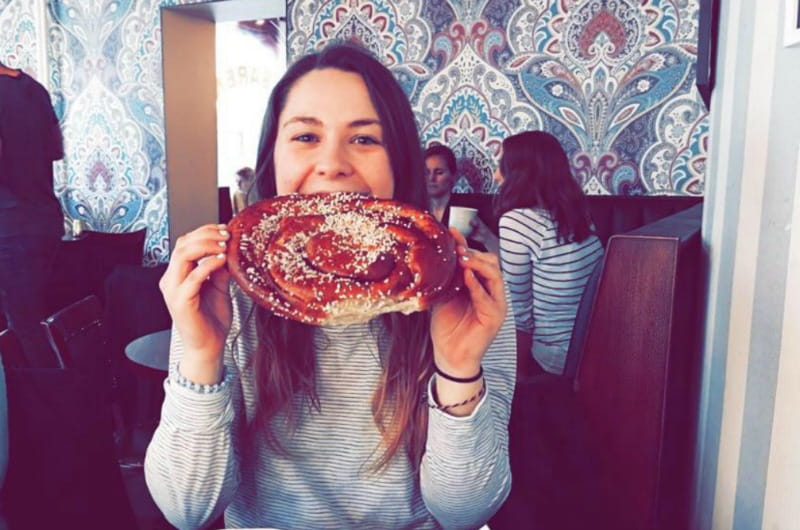Making the Most of Drexel Connections and Swedish Culture

It’s important to make connections and take advantage of every available resource while you’re at Drexel. Nobody knows that better than Alli Spiller, a pre-junior psychology student and criminal justice minor from the College of Arts and Sciences.
Spiller used said connections and resources to create and finance a three-month research co-op in Trollhättan, Sweden. She was able to take this trip was because of the International Experience Funding Award she received from Drexel’s Office of International Programs. She heard about the award from her two-time co-op employer Gabriela Marcu, PhD, an assistant professor in the College of Computing & Informatics.
It all began last year when Spiller started her first research co-op in Marcu’s Emphatic Design and Technology lab, which specializes in research that addresses social problems through design and technology.
“Co-op is an opportunity to explore different interests, to rule them either in or out of future career plans,” said Spiller. “Research was one area I had yet to delve into, so that intrigued me and made me want to work in the lab.”
During that time, she met Jonathan Arevalo, a co-op exchange student from Sweden’s University West. As co-ops, they worked on the lab’s interdisciplinary projects like Lilypad, an app that helps classroom staff record behavioral information and create intervention plans for students. Spiller implemented Lilypad at an elementary school with two behavior disorder classrooms. She gathered observational data and conducted focus groups with the staff as they learned to use app.
As a result, Spiller became interested in researching communication methods between parents and teachers, especially in the special-education setting. She continued this research while working part-time in the lab after she completed her co-op.
Arevalo, who still works with the lab even though he returned to his college in Sweden, had followed Spiller’s research in home-to-school and school-to-home communication in special education. He decided to write his thesis on what that process is like in Sweden and invited Spiller to help him with the research. Spiller turned the opportunity into a second research co-op with Marcu, who encouraged Spiller to apply for the Drexel grant she later received.
“I had never been abroad before, so at first I was a little nervous about the whole trip,” Spiller said. “But it was an amazing opportunity that I would have been foolish to give up. I knew I would not only learn so much more about special education and communication in that realm, but I would also grow as a person. That made the decision to go an easy one.”
Spiller travelled to Sweden in April and spent the next three months working with Arevalo to conduct interviews with Swedish teachers and parents. They analyzed their findings and compared them with Spiller’s results from similar surveys in America.
“We found that communication between parents and teachers in Sweden is very laid back and individualized as compared to the United States,” said Spiller.
For example, Swedish parents desired only the communication they needed, whereas American parents wanted as much information and communication as possible. Both parents, however, preferred electronic delivery of information because it could be accessed from anywhere. Swedish and American parents both agreed electronic communication was more reliable than child-dependent communication, such as sending notes home with students.
“The whole experience was amazing,” said Spiller. “Up until then, without even realizing it, I had been working on Lilypad and other endeavors in the lab with a one-track mind. In Sweden, I was exposed to a completely different culture where the special-education system is very different and comes with a different connotation than it does in America.”
In Sweden, Spiller lived in a student housing building in Trollhättan and frequently took the train to nearby Gothenburg, the second-largest city in Sweden. In Sweden, she enjoyed the long sunny days and sunsets that start at around midnight. She discovered she loved eating Swedish cinnamon buns, which are so beloved that there is a National Cinnamon Bun Day. While abroad, Spiller traveled to Copenhagen, Rome and London.
“Being in Sweden and traveling around to different countries has given me a much greater appreciation for different cultures,” she said. “I think it can be easy to get caught up in a bubble and not really acknowledge the world outside of what you know, which is exactly what happened to me. Now that I have seen the world outside my previous comfort zone, I dread the thought of having to stay in one place for long.”
About the Drexel Co-op program: More than 98 percent of eligible undergraduate students at Drexel participate in the co-op program, balancing full-time classes and up to three different internships during their time at Drexel. Students can choose from more than 1,700 employers in 33 states and 48 international locations — plus endless possibilities through self-arranged placements.
Drexel News is produced by
University Marketing and Communications.

